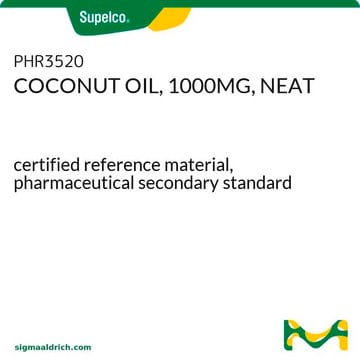C1758
Coconut oil from Cocos nucifera
low-melting solid
Synonym(s):
Coconut fat, Copra oil
Sign Into View Organizational & Contract Pricing
All Photos(2)
About This Item
Recommended Products
biological source
Cocos nucifera
Quality Level
form
low-melting solid
mp
23-27 °C
lipid type
oils
shipped in
ambient
storage temp.
room temp
Looking for similar products? Visit Product Comparison Guide
Application
- Linseed, Baru, and Coconut Oils: NMR-Based Metabolomics, Leukocyte Infiltration Potential In Vivo, and Their Oil Characterization. Are There Still Controversies: This research utilizes NMR-based metabolomics to explore the biochemical properties of various oils, including coconut oil, and investigates their potential for leukocyte infiltration in vivo. The findings contribute to understanding the health implications and biochemical interactions of coconut oil (Figueiredo et al., 2022).
Physical form
Usually a solid at room temperature
Storage Class Code
11 - Combustible Solids
WGK
WGK 1
Flash Point(F)
>235.4 °F - closed cup
Flash Point(C)
> 113 °C - closed cup
Personal Protective Equipment
dust mask type N95 (US), Eyeshields, Gloves
Choose from one of the most recent versions:
Already Own This Product?
Find documentation for the products that you have recently purchased in the Document Library.
Customers Also Viewed
Ryan Pannorfi et al.
Physiological and biochemical zoology : PBZ, 85(4), 405-414 (2012-06-19)
Heterothermic rodents increase self-selection of diets rich in polyunsaturated fatty acids (PUFAs) when exposed to cold, short days, or short-day melatonin profiles, and Djungarian hamsters (Phodopus sungorus) do so in long days in response to cold exposure alone. To determine
Young Taek Oh et al.
Physiology & behavior, 167, 194-201 (2016-10-25)
Previous rodent studies showed that when injected into the brain, free fatty acids (FFAs) reduced food intake in an oleate-specific manner. The present study was performed to test whether food intake is regulated by circulating FFAs in an oleate-specific manner.
Sakunthala Arunima et al.
The British journal of nutrition, 111(10), 1782-1790 (2014-02-12)
The present study was carried out to evaluate the effects of virgin coconut oil (VCO) compared with copra oil, olive oil and sunflower-seed oil on the synthesis and oxidation of fatty acids and the molecular regulation of fatty acid metabolism
M Hollmann et al.
Journal of dairy science, 96(3), 1769-1781 (2013-01-15)
Dietary coconut oil (CNO) can reduce dry matter intake (DMI), enteric methane (eCH(4)) emissions, and milk fat yield of lactating cows. The goals of this research were to examine responses to different CNO concentrations during the habituation period (34-d) and
Aida Serra et al.
Nutrition (Burbank, Los Angeles County, Calif.), 28(11-12), 1165-1171 (2012-08-04)
Phase II biotransformation of flavonoids generates bioactive metabolites in vivo. However, data on the effect of environmental and physiologic factors and fetal programming on phase II pathways toward flavonoids are limited. We examined the effect of parental exposure to a
Our team of scientists has experience in all areas of research including Life Science, Material Science, Chemical Synthesis, Chromatography, Analytical and many others.
Contact Technical Service








